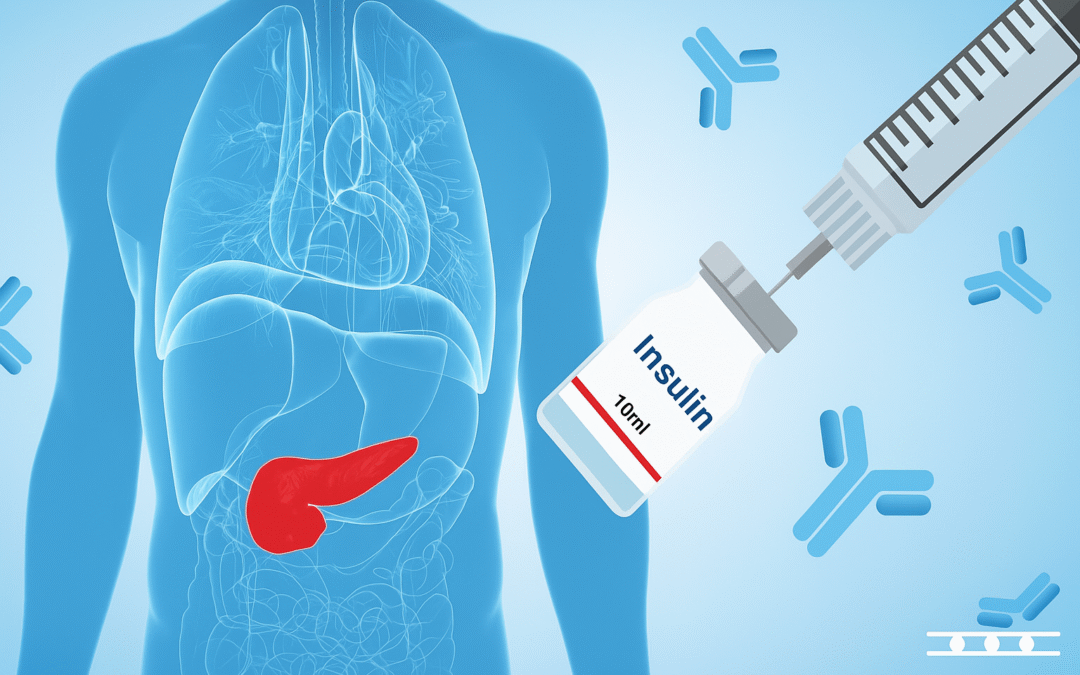Exploring the Role and Impact of Autoantibodies in Understanding Diabetes
Introduction
Autoantibodies are antibodies that mistakenly target and react with an individual’s own tissues or organs. In the context of diabetes research, autoantibodies play a pivotal role, particularly in type 1 diabetes (T1D). The presence of these autoantibodies is a hallmark of autoimmune diabetes, where the body’s immune system attacks the insulin-producing beta cells in the pancreas.
The Importance of Autoantibodies in Diabetes
Autoantibodies are critical in the early detection and diagnosis of type 1 diabetes. They serve as biomarkers that can identify individuals at risk before the onset of clinical symptoms. This early identification is crucial as it allows for timely intervention, potentially delaying or preventing the full development of the disease.
Key Autoantibodies in Type 1 Diabetes
Several specific autoantibodies are associated with type 1 diabetes:
- Islet Cell Cytoplasmic Autoantibodies (ICA): These autoantibodies target the islet cells in the pancreas and are among the first to appear in individuals developing T1D.
- Glutamic Acid Decarboxylase Autoantibodies (GADA): These autoantibodies target the enzyme glutamic acid decarboxylase (GAD), which is present in pancreatic beta cells.
- Insulin Autoantibodies (IAA): These autoantibodies target insulin itself and are often the first to appear in young children developing T1D.
- Insulinoma-Associated-2 Autoantibodies (IA-2A): These autoantibodies target the protein IA-2, a component of the insulin secretory granules in beta cells.
- Zinc Transporter 8 Autoantibodies (ZnT8A): These autoantibodies target the zinc transporter protein 8, which is involved in the regulation of insulin secretion.
Autoantibodies in Research and Clinical Practice
The presence of multiple autoantibodies increases the risk of developing type 1 diabetes. Researchers use these autoantibodies to predict the onset of diabetes, study the progression of the disease, and understand the underlying autoimmune mechanisms. In clinical practice, screening for these autoantibodies can help identify at-risk individuals, allowing for closer monitoring and early intervention.
Predictive Value
Autoantibody testing is a powerful tool in predicting the development of type 1 diabetes. Studies have shown that individuals with multiple autoantibodies have a significantly higher risk of developing the disease compared to those with none or only one autoantibody. This predictive ability is particularly valuable in family members of individuals with T1D, who are at increased risk.
Research Applications
In research, autoantibodies are used to study the pathogenesis of type 1 diabetes. By understanding the timeline and sequence of autoantibody appearance, researchers can gain insights into the autoimmune process that leads to beta cell destruction. This knowledge is essential for developing targeted therapies and preventive strategies.
Autoantibodies and Type 2 Diabetes
While autoantibodies are primarily associated with type 1 diabetes, recent research has explored their potential role in type 2 diabetes (T2D). Some studies suggest that a subset of T2D patients may have an autoimmune component, characterized by the presence of autoantibodies. This condition, known as Latent Autoimmune Diabetes in Adults (LADA), shares features of both type 1 and type 2 diabetes and can complicate diagnosis and treatment.
LADA and Autoantibodies
LADA is often misdiagnosed as type 2 diabetes due to its gradual onset and occurrence in adults. However, the presence of autoantibodies, particularly GADA, can help distinguish LADA from typical T2D. Identifying LADA is crucial as it impacts treatment decisions, with insulin therapy often being required earlier than in standard T2D management.
Advances in Autoantibody Research
Recent advances in autoantibody research have led to the development of more sensitive and specific assays, improving the accuracy of autoantibody detection. Additionally, ongoing studies are exploring the potential of autoantibodies as therapeutic targets. By modulating the autoimmune response, it may be possible to preserve beta cell function and prevent the progression of diabetes.
Biomarker Discovery
The discovery of new autoantibodies and other biomarkers continues to advance our understanding of diabetes. Researchers are investigating the role of novel autoantibodies in disease progression, aiming to identify additional markers that could improve prediction and diagnosis.
Therapeutic Implications
Targeting autoantibodies and the autoimmune response holds promise for developing new treatments. Immunotherapies that specifically target the immune cells producing autoantibodies are being explored as potential interventions to halt or reverse the autoimmune attack on beta cells.
Conclusion
Autoantibodies play a critical role in diabetes research, offering valuable insights into the autoimmune processes underlying the disease. Their presence serves as a key indicator of type 1 diabetes risk, aids in early diagnosis, and helps differentiate between types of diabetes. Ongoing research and advances in autoantibody detection and targeting hold the potential to transform diabetes management, leading to better outcomes for individuals at risk or living with the disease.
By continuing to explore the complex relationship between autoantibodies and diabetes, we can pave the way for more effective preventive measures and novel therapeutic approaches, ultimately improving the lives of millions affected by this chronic condition.
Download the full article here
The purpose is to provide information about available tools and services for Lifescience research. For questions/comments please send an email to Editor, ITSIBio News, itsi@itsibio.com.


